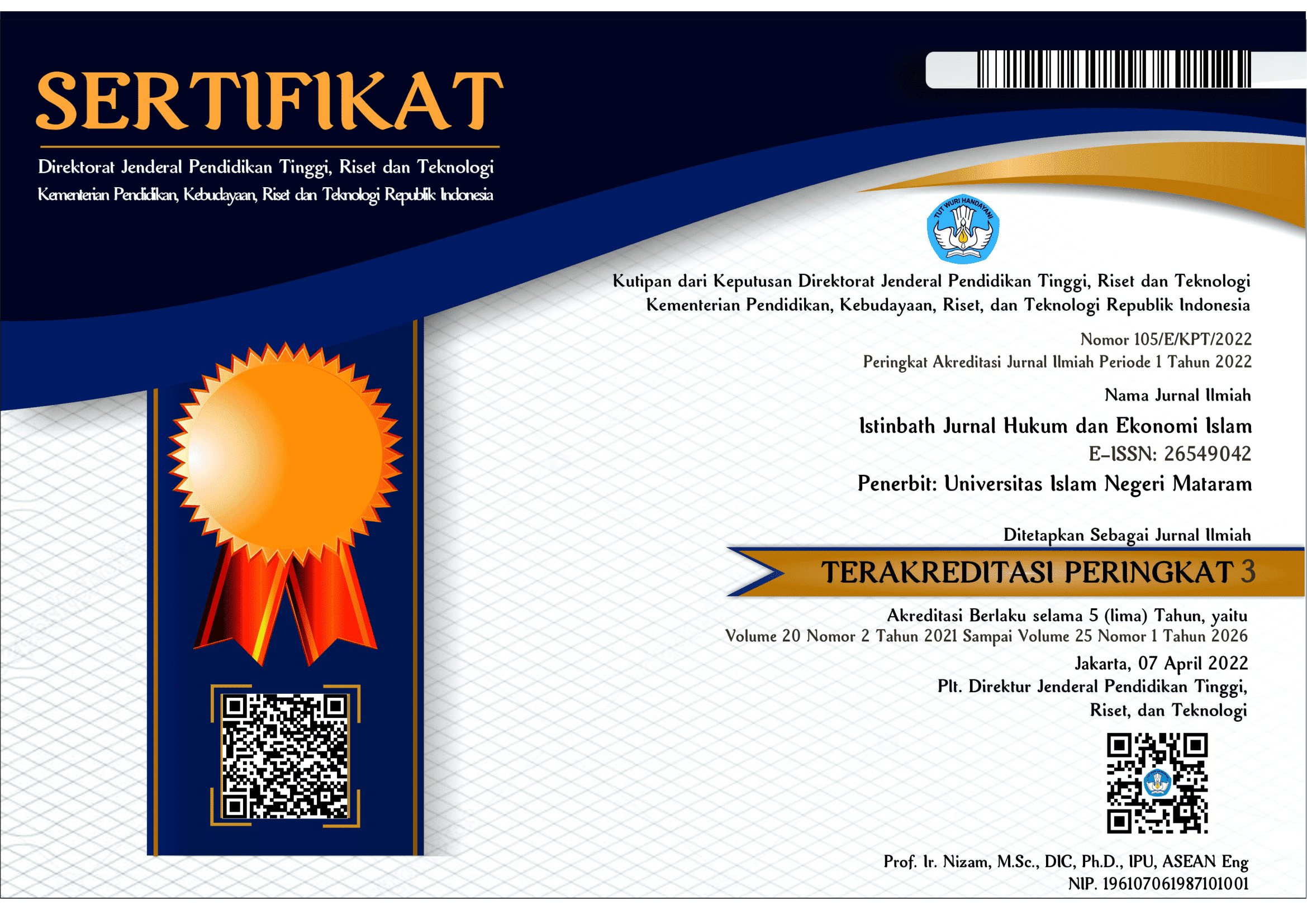PENGEMBANGAN WISATA HALAL UNTUK KESEJAHTERAAN MASYARAKAT DI KOTA MATARAM
DOI:
https://doi.org/10.20414/ijhi.v19i2.272Keywords:
halal tourism, tourism object development, Human Development Index, public welfareAbstract
West Nusa Tenggara (NTB) is one of Indonesia’s leading halal tourist destinations. This makes business opportunities open for the local community and will be able to improve the welfare of the community. All districts participated in the development of halal tourism to increase the number of tourist visits to NTB. The city of Mataram, the capital of the NTB province, is no exception. Mataram is also actively building and developing halal tourism by packaging existing tourist destinations into attractive halal tourist destinations. Seeing the rapid development of halal tourism in NTB, this study was conducted to examine the development of Halal Tourism in the City of Mataram and to determine the contribution of the development of halal tourism to the welfare of the people in Mataram City. This research is a descriptive qualitative study in which the primary data are informants from the City of Mataram Tourism Office, Mataram City Promotion Board, Tourism Actors and tourists that visiting Mataram while secondary data are obtained from various reports, books, publications, websites and others. The results of this study aimed that the development of halal tourism carried out by the Mataram City Government was quite good. This is proven by the increasing number of tourists visiting Mataram City each year. Development of halal tourism is done by improving facilities and infrastructure at tourist destinations, promoting both local and international, providing public transportation that is good enough to access tourist attractions, providing accommodations in accordance with sharia provisions so as to provide comfort for tourists especially Muslim tourists. With various efforts to develop tourist destinations that have been carried out by the Government of the City of Mataram has an impact on improving the welfare of the people of the City of Mataram, which is illustrated through the increase in the HDI index from year to year.
References
Provinsi Nusa Tenggara Barat Nomor 2 Tahun 2016 Tentang Pariwisata Halal
di Kota Mataram dan Kabupaten Lombok Timur. Tesis Fakultas Hukum
Universitas Gadjah Mada.
Alwafi Ridho Subarkah, Potensi dan Prospek Wisata Halal dalam meningkatkan
Ekonomi Daerah (Studi Kasus: Nusa tenggara Barat), Jurnal Sospol, 4 No 2
(2018): 49-72.
Bambang Sunaryo, Kebijakan Pembangunan Destinasi Pariwisata Konsep dan
Aplikasinya di Indonesia (Gava Media: Yogyakarta,2013).
Binahayati Rusyidi, Muhammad Fedryansah, “Pengembangan Pariwisata Berbasis
Masyarakatâ€, Jurnal Pekerjaan Sosial, 1 No. 3 (2018): 155-165.
Chandra, Geetanjali Ramesh, Halal Tourism; A New Goldmine For Tourism,
International Journal of Bussiness Management & Research (IJBMR) 4, Issue 6
(2014): 45-62.
Djakfar Muhammad, Pariwisata Halal Perspektif Multidimensi, Peta jalan Menuju
Pengembangan Akdemik dan Industri halal di Indonesia (Malang: UIN Maliki
Press, 2017): 179.
Dogra, Ravinder and Gupta, Anil, “Barriers to Community Participation in Tourism
Development: Empirical Evidence from a Rural Destinationâ€, South Asian
Journal of Tourism and Heritage 5, (2012): 131-142.
Eka Dewi Satriana, Hayyun Durrotul Faridah, “Wisata Halal: Perkembangan,
Peluang, Dan Tantanganâ€, Journal of Halal Product and Research (JHPR) 01,
No.02 (2018): 32-43.
Fatwa DSN MUI No.108 Tahun 2016 Tentang Pedoman Penyelenggaraan Pariwisata
Berdasarkan Prinsip Syariah.
Hadinoto, Kusudianto, Perencanaan Pengembangan Destinasi Priwisata, (Jakarta:
Universitas Indonesia, 2016) : 59.
Indeks Perjalanan Muslim Global (GMTI – Global Muslim Travel Index), 2019
James J. Spillane, Ekonomi Pariwisata (Yogyakarta: Kanisius,1987): 21.
Kurniawan Gilang Widagdyo, “Analisis Pasar Pariwisata Syariah di Indonesiaâ€, The
Journal of Tauhidinomics 1, No 1 (2015) :74.
Pearce, D., Tourist Development (New Zealand: University of Cantenbury, 2981) :
12.
Peraturan Daerah Provinsi Nusa Tenggara Barat No. 2 tahun 2016 tentang Pariwisata
Halal.
Sureerat Chookaew, “Increasing Halal Tourism Potential at Andaman Gulf in Thailand
for Muslim Country. Journal of Economicsâ€, Business and Management 3, No.
7 (2015): 741.
Sriprasert, Piangpist, “Understanding Behavior and Needs of Halal Tourism in
Andaman Gulf of Thailand: A Case of Asian Muslimâ€, Journal of Advanced
Management Science 2, No. 3 (2014)
Syeda Tamanna Fahim &Evana Nusrat Dooty, “Islamic Tourism: In the Perspective
of Bangladeshâ€, Global Journal of Management and Business Research: Real
Estate Event & Tourism Management 14, Issue 1 (2014): 20-26.
Undang-Undang Nomor 10 Tahun 2009 tentang Kepariwisataan.
Unggul Priyadi, Pariwisata Syariah Prospek dan Perkembangan (Yogyakarta: UPP
STIM TKPN, 2016), 23.
Yoeti, Oka A, Pemasaran Pariwisata (Bandung: Angkasa, 2001): 79.




